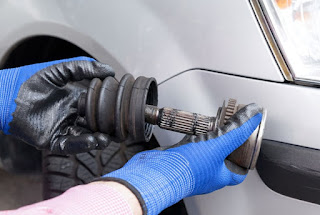CV joints (constant velocity joints) play a crucial role in
transmitting power from the transmission to the wheels while allowing
flexibility and smooth movement. Over time, these joints can wear out or become
damaged, leading to various symptoms that indicate a faulty CV joint.
Addressing these symptoms promptly can help prevent further damage to your
vehicle and ensure a safe driving experience. In this article, we will discuss
five common symptoms of a faulty CV joint and the importance of check MOT history
to identify potential issues.
Clicking
or Popping Noises:
One of the most common signs of a faulty CV joint is the
presence of clicking or popping noises while making turns. These sounds
typically occur when the joint has lost its lubrication or the protective boot
has torn, allowing dirt and debris to enter and damage the joint. To diagnose
this issue, it is crucial to listen for any unusual noises while maneuvering
your vehicle. If you notice persistent clicking or popping sounds, it is
advisable to have your CV joints inspected and repaired by a qualified mechanic.
Vibrations
or Shuddering:
If you experience vibrations or shuddering while
accelerating, it may indicate a problem with your CV joints. Worn-out or
damaged CV joints can cause the wheels to wobble, leading to vibrations that
can be felt through the steering wheel or the entire vehicle. These vibrations
can worsen over time and affect the overall stability and handling of your
vehicle. Therefore, it is important to have your CV joints inspected and
repaired at the earliest sign of vibration or shuddering.
Grease
Leakage:
Grease leakage around the CV joint or on the inside of the
wheels is another red flag indicating a potential issue. CV joints are packed
with special grease to lubricate the moving parts and protect them from wear
and tear. When the protective boot tears or becomes damaged, the grease can
leak out, leaving the joint exposed to contaminants and leading to accelerated
deterioration. Regularly inspecting your CV joints for grease leakage and
addressing any leaks promptly can help prevent more severe damage and costly
repairs.
Difficulty
Turning:
Faulty CV joints can make steering your vehicle more
challenging, especially during turns. If you find it increasingly difficult to
turn the steering wheel or experience stiffness while maneuvering, it may be
due to damaged CV joints. This symptom can affect your ability to control the
vehicle properly, posing a safety risk. If you encounter difficulties when
turning, it is crucial to have your CV joints inspected by a professional
mechanic to determine the cause and carry out the necessary repairs.
Uneven
Tire Wear:
Uneven tire wear is a common consequence of faulty CV joints.
When the CV joints are damaged or worn, they can cause the wheels to operate at
incorrect angles, resulting in uneven wear patterns on the tires. Regularly
inspecting your tires for signs of uneven wear, such as excessive tread wear on
one side or in specific areas, can help you identify potential CV joint
problems. If you notice uneven tire wear, it is essential to have your CV joints
checked and repaired to avoid further tire damage and ensure optimal vehicle
performance.
Importance
of Checking MOT History:
To gain a comprehensive understanding of your vehicle's
condition and potential issues, it is crucial to MOT history check.
The MOT history provides valuable information about the vehicle's maintenance,
repairs, and any failures during previous MOT tests. By reviewing the MOT
history, you can identify past issues related to the CV joints and other
components, allowing you to make informed decisions regarding inspections and
repairs. Online platforms and government websites often provide easy access to
the MOT history of vehicles, enabling you to access this information
conveniently.
Conclusion:
The CV joints are vital components of your vehicle's
drivetrain, and any signs of malfunction should be addressed promptly to ensure
safety and prevent further damage. By paying attention to common symptoms such
as clicking or popping noises, vibrations, grease leakage, difficulty turning,
and uneven tire wear, you can identify potential issues with your CV joints.
Additionally, checking the MOT history of your
vehicle can provide valuable insights into past problems and help guide your
inspection and repair decisions. Regular maintenance, inspections, and timely
repairs by qualified professionals will contribute to the longevity and optimal
performance of your vehicle.

Comments
Post a Comment